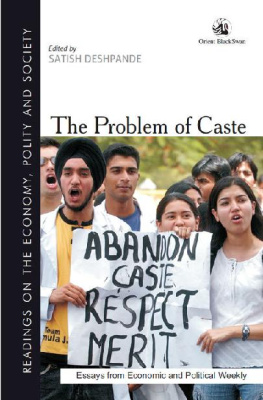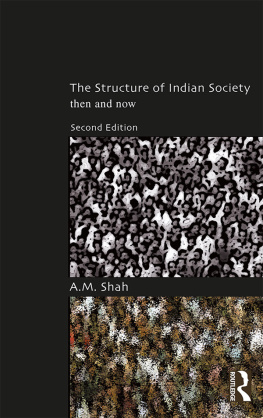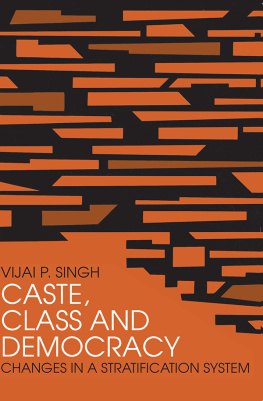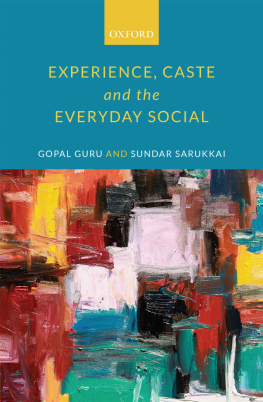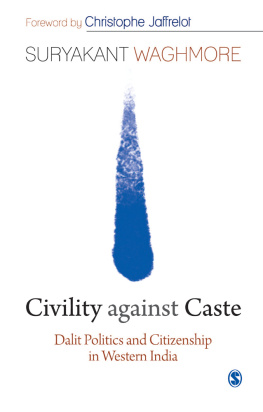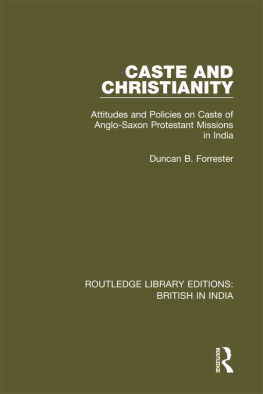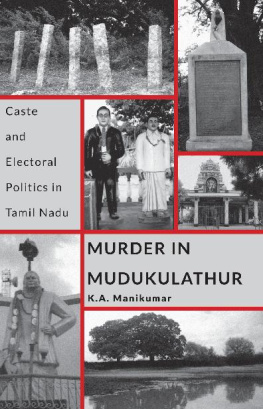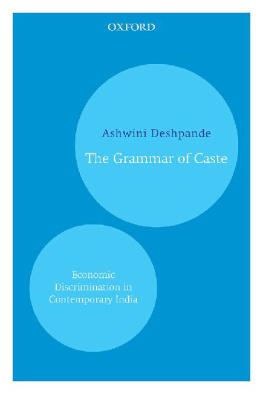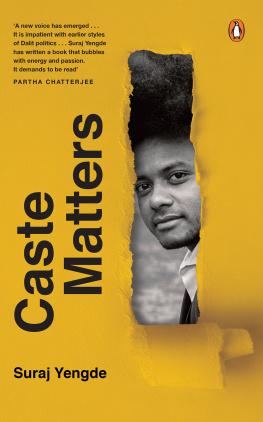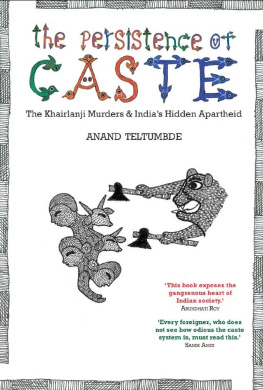The Problem of Caste
Readings on the Economy, Polity and Society
T his series is being published as part of a University Grants Commission project to promote teaching and research in the social sciences in India. The project (201012) has been jointly executed by the Tata Institute of Social Sciences, Mumbai, and the Economic and Political Weekly. The series is meant to introduce university students and research scholars to important research that has been published in EPW in specific areas. The journal has, over the decades, published a large number of research papers in all the social sciences. The readers draw on this archive of EPW s published articles. The titlesin economics, politics, sociology and the environmentreflect EPW s strengths as well as the interests of the academic community. Each set of readings is compiled by a senior academic who has also written an introductory essay for the volume. TISS and EPW are grateful to the authors of the articles included here for permission to reprint them.
Published
Economic Reforms and Growth in India, ed. Pulapre Balakrishnan
Environment, Technology and Development: Critical and Subversive Essays,
ed. Rohan DSouza
Village Society, ed. Surinder S. Jodhka
The Adivasi Question: Issues of Land, Forest and Livelihood, ed. Indra Munshi
Women and Work, ed. Padmdmini Swaminathan
Decentralisation and Local Governments: The Indian Experience,
ed. T. R. Raghunandan
Higher Education in India: In Search of Equality, Quality and Quantity ,
ed. Jandhyala B. G. Tilak
The Problem of Caste
The Indian Experience
Edited by
T . R . R aghunandan
Orient BlackSwan Private Limited
Registered Office
3-6-752 Himayathnagar,Hyderabad 500 029 (Telangana), INDIA
e-mail:
Other Offices
Bangalore Bhopal Bhubaneshwar Chandigarh Chennai
Ernakulam Guwahati Hyderabad Jaipur Kolkata
Lucknow Mumbai New Delhi Patna
www.orientblackswan.com
Orient Blackswan Private Limited and Economic and Political Weekly 2014
First Published by Orient Blackswan Pvt. Ltd. 2014
eISBN 978 81 250 5763 5
e-edition first published in 2015
Typeset by,
Le Studio Graphique, Gurgaon 122 001
in Adobe Garamond Pro 10.5/12.5
Printed at,
B.B. Press
Noida
Published by,
Orient Blackswan Private Limited
1/24 Asaf Ali Road
New Delhi 110 002
e-mail:
All rights reserved. No part of this publication may be reproduced,distributed, or transmitted in any form or by any means, including photocopying, recording, or other electronic or mechanical methods, without the prior written permission of the publisher, expect in the case of brief quotations embodied in critical reviews and certain other noncommercial uses permitted by copyright law. For permission requests write to the publisher.
Contents
Caste Concerns in the Contemporary Social Sciences:
Six Decades of Writings in the Economic and
Political Weekly, 19582013
Satish Deshpande
Irawati Karve
M. N. Srinivas
Dipankar Gupta
Andr Bteille
Rajni Kothari
Kumkum Roy
Sukhadeo Thorat and Katherine S. Newman
Marc Galanter
Sundar Sarukkai
Gopal Guru
D. L. Sheth
Anand Chakravarti
Carol Upadhya
Ashwini Deshpande and Katherine S. Newman
Meena Gopal
Baldev Raj Nayar
Gail Omvedt
Mohan Ram
I. P. Desai
K. Balagopal
Sudha Pai
Anand Teltumbd e
Surinder S. Jodhka and Ghanshyam Shah
Marc Galanter
K. Balagopal
Susie Tharu, M. Madhava Prasad, Rekha Pappu and K. Satyanarayana
Padm anabh Samarendra
Satish Deshpande and Mary E. John
Uma Chakravarti
Prem Chowdhry
V. Geetha
Sharmila Rege
S. Anandhi, J. Jeyaranjan and Rajan Krishnan
Rekha Raj
Kancha Ilaiah
Susie Tharu
Aditya Nigam
M. S. S. Pandian
Satish Deshpande
Gopal Guru
Acknowledgements
As with all anthologies of this kind, my greatest debt is to all the authors assembled in this volume, some of whom are no longer with us. Thanks also to the incomparable EPW and its staff, including in particular its Editor, C. Rammanohar Reddy, and Urvi Desai, who did most of the work of compilation and annotation on which the fascinating data used in the Introduction (Table I.1) is based. Mary E. John contributed towards shaping this volume and helped to see it through.
Satish Deshpande
Delhi
1 April 2014
Introduction
Caste Concerns in the Contemporary
Social Sciences: Six Decades of
Writings in the Economic and
Political Weekly , 19582013
Satish Deshpande
A s one of a series of volumes sponsored by the University Grants Commission (UGC), this book aims to provide researchers, teachers and especially students easier access to the immense intellectual resource that is the Economic and Political Weekly ( EPW ). Anyone familiar with the social science scene in India knows that the EPW occupies a unique place not only in local-regional intellectual life but also globally. This is not just because its contents straddle the divide between scholarly writing and social-political commentary, but also because it stretches across disciplines and has the unheard of periodicity (for academic journals) of one week. As an independent journal that hosts both academics and activists, that is scholarly yet not discipline-identified, the EPW is undoubtedly the single most important general barometer of intellectual concerns in the Indian context. This is true even though the EPW is not necessarily the best indicator of trends in the academic mainstream, given its changing relationship with different disciplines. Moreover, independence from institutional orthodoxy is an asset when it comes to caste, both because social theory has lagged behind empirical developments, and because contemporary caste transcends disciplinary boundaries.
Though it is obviously concerned with the social science disciplines, this book does not seek to represent any particular disciplinary perspective on caste. Instead it tries to exploit the unique resource that the EPW represents in order to track how intellectuals across academic disciplines have responded to the caste question in independent India. Before highlighting some of the significant aspects of this collective response, it is necessary to give the reader some sense of how the articles collected in this volume relate to the larger body of writing from which they are drawn.
Part I
Questions of Representation
Table I.1 presents the decade-wise distribution of the number of articles on caste published in the Economic Weekly ( EW ) and the EPW from the 1950s to 2012. The number of articles is perhaps the most robust but also a relatively crude indicator of levels of interest on the subject. In compiling these data, the initial method was a database search of article titles for the word caste or closely related terms (Dalit, Scheduled Caste [SC], Other Backward Classes [OBCs], untouchability, etc.). Because of the high risk of missing relevant articles by this method, the blurbs of articles were browsed in an issue-by-issue manual search. So while the numbers themselves are robust, some contextual qualifications need to be kept in mind: (a) There is no method for weighting an article according to some measure of its relative importance. The only rough index of this is the division between special articles and other articles, EPW terminology for scholarly-academic articles and topical commentaries respectively. While scholarly articles are usually research-based and longer, many other articles (especially in the period since the 1990s) have been equally or more influential; (b) The number of articles published and especially the variation in these numbers across time may be affected by exogenous factors relating to logistics or editorial policy. For example, the average size of an issue of the journal (in terms of number of pages) has increased from the early decades to the more recent period. Moreover, the Special Articles feature has also increased significantly in relative weight since the early decades. From the 1980s onwards, the average issue of the EPW carries at least three or often four special articles, not counting special issues where curated collections might carry many more. Therefore, the special articles of the early decade carry more weight individually because of their smaller number. Finally, there is no way of checking if the increase in published articles since 1990 is solely due to an increase in submissions by authors writing on caste, or whether shifts in editorial policy also played some role by raising the acceptance rate for submissions on caste in the post-Mandal era. Fortunately, we need not worry too much about these kinds of qualifications because the broad trend in numbers is too strong to be just a statistical artefact.

